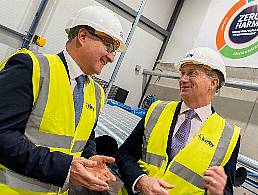HubSpot’s ConnectED event on 25 November gave university students unique insights into getting their first job in the tech industry.
The event included a guide for all students with tips on how to ace their interview and how to get their first tech job.
When it comes face-to-face interviews, researching your interviewers is key. Search for them on LinkedIn, learn about the company’s culture, and prepare your answers to possible questions.
HubSpot’s director or recruiting, Becky McCullough, advises candidates to “review the job description and come up with specific examples of how you’ve demonstrated the required skills in your past experience”.
To help you articulate this, you should use the ‘STAR’ framework, which stands for: Situation, Task, Action and Result. Essentially, describe a specific situation, explain the task you had to complete, describe the actions you took and conclude with the results of your efforts.
For any role you interview for, it is vital to ask the recruiters thoughtful questions throughout the interview process, to demonstrate curiosity and the research you’ve done.
Practice is key when it comes to your interviews. Once you’ve done your research, prepare strong answers to possible questions and come up with questions of your own, grab a friend and do a mock interview. Practising your interview will give you the preparation and confidence you need to perform your best on the big day.
Practising your interview style may also highlight some areas that need extra preparation. This isn’t just related to the content of your answers; have your friend watch your rhythm, your body language and your eye contact.
Take care when choosing your outfit. Wear something professional that makes you feel confident but also comfortable.
After the interview, be sure to follow up. Send a well-crafted email to express your gratitude for the opportunity, while reminding them why you are the right person for the job.
Technical interview tips
For tech roles, interviews can get a little specific and, well, technological. Luckily, HubSpot tech leads Lorcan O’Neill and John Reddin had some more precise advice for tech graduates going for interviews.
For software developers, any product roles will require technical interviews. These usually last between 30 and 60 minutes, during which an interviewer (often a senior engineer, team lead, or technical architect) is trying to ascertain your ability to take an abstract problem and break it into discrete tasks, rather than finding a solution to the exact problem given.
There may be a degree of “specialist knowledge” in some questions. For example, a front-end-focused question would expect you to know CSS/JavaScript, while a database-focused question would expect knowledge of relational databases.
Whether technical tests are given online or done on a whiteboard, the most important advice is: don’t be afraid to say, ‘I don’t know’ and ask for clarification. Interviewers know that you aren’t going to know everything, and they don’t want to see you fail. Being able to ask the right questions and respond accordingly with some prompting is an important skill for them to evaluate.
Furthermore, interviewers aren’t mind-readers and can’t automatically infer what you are intending to achieve with a solution. Over-communicate and make sure they know why you are doing something; this ensures that you get full credit for the ideas and concepts that you identify, and that the interviewer can help stop you from going down dead ends.
If you focus on explaining things explicitly, you will force yourself to produce a stronger and more robust solution.
If you want to get a feel for the kind of questions you may be asked in a technical interview, check out websites like Project Euler, Topcoder, and HackerRank. Then, grab a friend and practise working through some sample problems.
Looking for jobs in tech or science? Check out our Employer Profiles for information on companies hiring right now and sign up for our Career Republic e-zine for a weekly digest of sci-tech careers news and advice.




